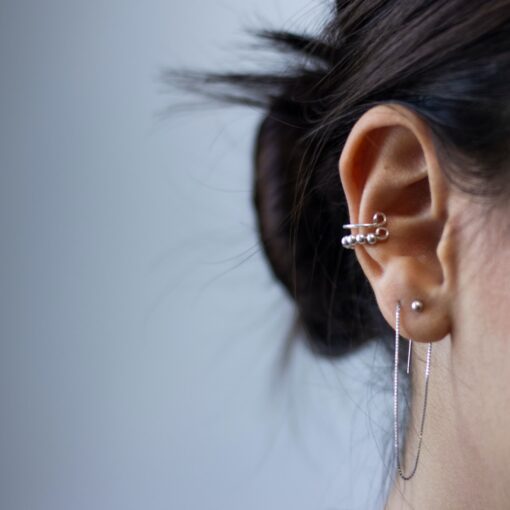Page Menu
Tinnitus is a condition where you experience sound when there is no actual sound. The sound can be very distracting and sometimes debilitating. Luckily, there are a number of things that can help you cope with tinnitus, including: avoiding caffeine, using earplugs when in noisy environments, listening to music or podcasts that provide a soothing background noise, breathing deeply and concentrating on your breath, and focused meditation.
Key Concepts and Top Takeaways
– Educate yourself: Learn about tinnitus to understand your condition better.
– Avoid loud noises: Use ear protection in noisy environments to prevent worsening symptoms.
– Manage stress: Practice relaxation techniques like meditation or yoga to reduce stress levels.
– Limit caffeine and alcohol: These can exacerbate tinnitus symptoms; consider reducing intake.
– Stay active: Regular physical activity can improve overall well-being and help manage symptoms.
– Create a soothing environment: Use background noise or white noise machines to mask ringing sounds.
– Maintain a healthy diet: Focus on a balanced diet rich in fruits, vegetables, and whole grains.
– Get enough sleep: Prioritize quality sleep to help reduce the impact of tinnitus on daily life.
– Seek professional help: Consult an audiologist or therapist for tailored coping strategies.
– Join support groups: Connect with others who have tinnitus for shared experiences and advice.
Please Note: This post may contain affiliate links. If you click one of them, we may receive a commission at no extra cost to you. As an Amazon Associate, I earn from qualifying purchases.

Tinnitus is a medical condition that affects the hearing system. It can often be disruptive to one’s life, but there are things you can do to make it easier to live with. One of which is talking with someone who has tinnitus just like you. You can also try relaxation exercises or composing your own music.
The ear is one of the most important and delicate areas of the human body. When things go wrong with it, life can seem out of balance and uncomfortable. One such issue is tinnitus, a condition in which people hear noises that are not really there. For many, the sounds are only temporary and go away over time. In other cases, they can be permanent or worsen over time, causing tremendous stress to those who suffer from them.
Tinnitus is a condition in which you hear noises you have never heard before. Tinnitus often manifests itself for the first time between the ages of 55 and 65. So, if you believe you're hearing noises you shouldn't, the information in the following paragraphs may help you figure out what to do.
Get Tested For Ménière's Disease If You Have Tinnitus
 Ménière's disease is an inner ear disorder that commonly causes tinnitus, vertigo, hearing loss, and other symptoms. It often goes undiagnosed for years because the symptoms are so similar to those felt by people who have high blood pressure or benign positional vertigo. Even when doctors do know it may be Ménière’s disease, the diagnosis isn't confirmed until a patient has undergone specialized testing.
Ménière's disease is an inner ear disorder that commonly causes tinnitus, vertigo, hearing loss, and other symptoms. It often goes undiagnosed for years because the symptoms are so similar to those felt by people who have high blood pressure or benign positional vertigo. Even when doctors do know it may be Ménière’s disease, the diagnosis isn't confirmed until a patient has undergone specialized testing.
Ménière's disease is a condition that affects the inner ear and can lead to hearing loss, dizziness, or tinnitus. Tinnitus is defined as the perception of noise or ringing in the ears, which may be constant or intermittent in nature. People with Ménière's disease are 3x more likely to have tinnitus than people without Ménière's disease.
Ménière's disease is an incurable disorder involving the inner ear. Ménière's disease often starts with a sudden attack of severe dizziness or vertigo, followed by episodes of deafness or tinnitus. Attacks are unpredictable and come on without warning. Tinnitus is a ringing, buzzing, hissing, or whistling in the ear that sometimes increases in intensity with Ménière’s attacks. It can create emotional distress and disrupt concentration.
If you think you have Tinnitus but are above the age of 50, you should have your doctor test you for Meniere's Disease. This condition may cause the same symptoms as Tinnitus but is much more severe; thus, a diagnosis is necessary to assist treat it before it worsens!
Learn How To Do Pilates If You Have Sinus
 Pilates is an exercise program that can help with sinus issues. It is now estimated that over 45 million Americans suffer from chronic sinus issues, which can be frustrating and debilitating.
Pilates is an exercise program that can help with sinus issues. It is now estimated that over 45 million Americans suffer from chronic sinus issues, which can be frustrating and debilitating.
This is why practicing Pilates exercises regularly may be the way to go if you want to alleviate some discomfort caused by sinus problems.
The exercises include stretching, breathing, and strengthening the core muscles. This helps keep your spine aligned and strengthens your core muscles.
A little more than 100 years ago, Joseph Pilates developed an exercise routine that utilizes controlled stretching and body alignment in order to develop strength and flexibility. This exercise routine is now known as Pilates, and when done properly can help alleviate back pain, fatigue, headaches, sinus problems, and even arthritis.
Many people suffer from chronic sinus pain. It has been estimated that one in every five adults suffers from chronic sinus pain, and it is typically linked to allergies, infections or structural issues. Some treatments include antibiotics, nasal rinses, antihistamines and even surgery. However, many people turn to Pilates as a natural way to release tension in the neck and shoulders while strengthening the abdominal muscles. Pilates can be done at home without any equipment needed for 10 minutes a day.
Learn how to do Pilates. Pilates may help you manage your stress, which is one of the factors that contribute to tinnitus. If you can find out how to cope with stressful circumstances, you will have greater flexibility to do the activities you like without worry of worsening your condition.
Time Management Is An Excellent Strategy To Decrease Stress And Prevent Tinnitus
 Do you find it hard to make time for self-care? Do you want to decrease your stress levels and prevent tinnitus? Fear not, there are many ways to work on your mental health while also decreasing your stress levels. One way is by practicing the skill of time management.
Do you find it hard to make time for self-care? Do you want to decrease your stress levels and prevent tinnitus? Fear not, there are many ways to work on your mental health while also decreasing your stress levels. One way is by practicing the skill of time management.
Many people are stressed out in their lives, but luckily there are so many things you can do to reduce the stress. One of these is time management. By using your time wisely, you can decrease your level of stress. Additionally, practicing good self-care habits also helps decrease stress levels. If you don't know what to do to manage your time, or how to best care for yourself, then please contact a company like Tinnitus Solutions LLC.
Tinnitus is a condition of the inner ear that causes difficulty hearing, but it can also be caused by stress. Time management is an excellent strategy to decrease stress and prevent tinnitus. By prioritizing your day, you are able to avoid unnecessary stressors, which ultimately decreases your risk for developing tinnitus.
Time management is an excellent strategy to decrease stress and prevent tinnitus. Investing in efficient time management software can assist you in keeping track of both your professional and personal life so that you don't miss any occasions and can instead rest knowing that everything is under control.
Tinnitus May Be Managed By Using White Noise
Tinnitus is often called “ringing in the ears” because people with tinnitus typically hear a sound that resembles an ever-present ringing or hissing. For many, the condition is merely an annoyance that can be ignored. However, for others it can be so severe as to cause sleep deprivation and depression. Scientists are exploring how to manage tinnitus with white noise.
For many people, white noise is a sound that helps them sleep better at night. It is a form of sound therapy to help manage symptoms of tinnitus, a disorder characterized by ringing in the ear. Tinnitus can be disruptive and debilitating, but with some simple steps it might be possible to get relief from symptoms. These include ideas such as wearing ear plugs or listening to music through headphones, or playing soothing sounds from an alarm clock.
There is a scientific debate over the validity of tinnitus as an actual disorder. What is known for certain, however, is that tinnitus can be triggered by loud noises and strenuous exercise. Unfortunately, tinnitus can also persist for years or decades after the source of the condition has dissipated. For those who experience this constant ringing in their ears, there are many institutes which offer treatments to help alleviate symptoms.
Tinnitus may be managed by using “white noise.” Even if your doctor has ruled out any treatable illnesses, you may reduce the feeling of ringing or whistling in your ears by utilizing external masking noises such as an electric fan or quiet music. White noise may also improve your sleep, which is beneficial to your general health.
Vapor Rub Can Be Useful For Tinnitus
Many people who suffer from tinnitus want to know what can be done for it. There is no cure as of yet, but there are some things that you can do to help lessen the pain and discomfort. One of those things is using vapor rub on your neck and chest before going to bed. Vapor rub provides a cooling sensation and can re-balance your body's circulation. It also contains menthol, which is an anti-inflammatory and helps relieve pain.
Tinnitus can be a debilitating condition, and sufferers should do what they can to reduce the noise in their ears. There are many treatments that have been successful, including those that use vapor rub as the active agent. Vapor rub helps relieve congestion and other symptoms of a cold, which can help improve tinnitus. In addition to these benefits, the generic products are less expensive than name brands.
Many people suffer from the disorder known as tinnitus. It is a noise that originates in the ears that can be very loud and annoying. Tinnitus sufferers may notice a ringing, buzzing, or hissing sound in their ears, which they often find difficult to ignore.
In rare cases, tinnitus may also manifest as a clicking, beating, or roaring sound. In most cases of tinnitus, there is no underlying medical issue.
If your tinnitus is caused by sinuses, pressure in the head, or the Eustachian tubes, Vapor Rub has been shown to assist some people. The usage of the vapor rub has been reported to have a soothing impact on certain patients' tinnitus. It is suggested that you apply some before going to bed at night for the greatest effects.
Avoid Salt And Caffeine If You Have Tinnitus
 Tinnitus is the medical term for ringing in the ears. Tinnitus is often perceived either in one or both ears or in the head. It can be annoying or even painful for people to live with, especially when it bothers them all day long. If you have tinnitus, there are some things that you can do to help you live easier with your condition.
Tinnitus is the medical term for ringing in the ears. Tinnitus is often perceived either in one or both ears or in the head. It can be annoying or even painful for people to live with, especially when it bothers them all day long. If you have tinnitus, there are some things that you can do to help you live easier with your condition.
Tinnitus is a type of hearing loss that causes the sufferer to hear sounds that are not actually present. It can be caused by natural aging or by exposure to loud noises such as those from power tools, gunshots, and car accidents. Tinnitus is often related to high blood pressure and circulatory problems, but there is no definitive cause.
Tinnitus, or ringing in one's ears, can be caused by salt and caffeine intake. According to the National Institute on Deafness, Tinnitus is a condition that causes constant sounds. The condition can be caused by anything from illness to an ear problem, but it is often brought about by something seemingly benign- too much salt or caffeine. A study found that high levels of sodium and caffeine were associated with increased risk of tinnitus in adults.
If you suffer from tinnitus, you should attempt to avoid meals that have a high quantity of salt or caffeine. These foods are known to aggravate tinnitus, and if you avoid them entirely, you will have considerably less of a problem throughout the day and night.
Consult With A Hearing Expert If You Have Tinnitus
Tinnitus is a ringing, buzzing, screeching, or hissing sound in the ears. It’s one of the most common medical conditions in the world, affecting 10-15 percent of the population. What you need to know is that tinnitus can have many causes and no consequences, but it’s always best to consult with a hearing expert if you have tinnitus.
Tinnitus is caused by damage to the inner ear. If you are experiencing tinnitus, consult with a hearing expert to see what can be done for you. The most common treatment for tinnitus is sound therapy, but if this doesn't work for you, there are other options available.
Tinnitus is a disorder that causes an individual to hear phantom noises, or sounds, in their ears. These sounds can be constant or intermittent, and are usually accompanied by periods of complete silence. It's estimated that 1 in every 10 people will experience tinnitus at some point in their lives. If you've been experiencing symptoms for over 3 months, then speak with a hearing expert because there are ways to correct your condition.
Consult with a hearing expert. Your basic care physician should be able to send you to an ear and hearing specialist. This medical expert will tell you more about what is going on physiologically and how you may be able to remedy the tinnitus. For example, it may be as easy as eliminating wax accumulation.
Visit A Therapist If You Have Tinnitus
Tinnitus is the medical term for ringing in the ears. People who experience tinnitus might hear buzzing, humming, or whistling in one or both ears. Tinnitus can be intermittent or continuous, and it can range from very soft to very loud. It can be more disturbing when it's louder.
Tinnitus is a condition that is characterized by ringing or buzzing in the ear. This makes it difficult to sleep and concentrate, which can cause emotional problems. Some may relieve tinnitus by learning ways to live with it, but most people experience relief after visiting a therapist for counseling and other treatments.
Tinnitus is the sound of ringing, buzzing, or roaring in a person’s ear. It can be caused by many things, but it usually occurs as a result of hearing damaged. For those who suffer from tinnitus on a daily basis, this sound distracts from everyday life and interferes with sleep. Some people may not even realize they have tinnitus until they start to notice a constant ringing in their ears.
Consider visiting a therapist. If tinnitus is creating stress in your life, seeing a therapist to discuss stress-reduction techniques is definitely a smart option. Tinnitus will be simpler to manage if you reduce stress in other aspects of your life; a therapist may assist you with this.
Go For A Long Walk If You Have Tinnitus
Tinnitus is a condition that causes ringing in the ears and can be overwhelming to live with. However, if you find that your tinnitus is bothering you then there are ways that you can help. One way to lessen the severity of your tinnitus is to walk for 30 minutes a day. This will help get your blood flowing through your head and may minimize the ringing sound in your ears.
Tinnitus is a condition that causes an individual to hear phantom sounds when there's no external sound. It's been shown that when people who have tinnitus go for a long walk, their perceived volume of the phantom sounds decrease. In other words, when one exercises in a gym or goes for a long walk outdoors, it has been found that the Doppler effect can mask the sound of tinnitus.
Tinnitus is the persistent ringing in the ears that ranges from a light annoyance to a debilitating ring. If you get sudden, intense bouts of tinnitus, one way to stop it is to go for a walk. The sound of your own footsteps should counteract the sound of ringing or buzzing. Because this could startle others, you may want to take a stroll on your own. Walking can also help with stress and anxiety, which may contribute to tinnitus episodes.
To alleviate your tinnitus problems, go for a lengthy walk. You may benefit from some fresh air, and being active should help you relax. Keep note of the items in your surroundings that affect your tinnitus while walking. Certain noises, such as vehicle traffic, may aggravate your tinnitus. Make a list of the noises that aggravate the situation and avoid them.
Listening To The Radio Or Television Can Be Beneficial For Tinnitus Patients
Tinnitus is a sound that cannot be heard by others, but can be heard by the individual experiencing the condition. It is often caused by trauma to the ear such as constant noise or loud sounds. The continuous ringing in ears, whistling, clicking and hissing can become very unbearable for some individuals causing them to suffer from severe depression and even sleep deprivation.
Tinnitus is one of the most common neurological conditions, affecting an estimated 20% of adults and 50% of children. Tinnitus is a ringing, buzzing, or roaring sound in the ear that causes distress to individuals who have it. People with tinnitus often experience difficulty sleeping and concentrating on tasks due to the ongoing noise.
Many people suffer from tinnitus, a ringing in one’s ear which can last for up to 5 minutes at a time. This ringing is caused by the damage to the nerves that send messages to the brain about hearing. Tinnitus can be painful and debilitating for those who experience it, but there are steps that can help manage the symptoms of tinnitus. For example, listening to talk radio or watching television can distract the mind from the ringing sensation.
Having the radio or television on while working may be distracting, but it has been shown to benefit tinnitus patients. When you drown out part of the noise produced by your ringing ears, you can better focus on your job.
It Is Critical For Tinnitus Patients To Maintain A Balanced Diet
Tinnitus is a condition that causes ringing, buzzing or other sounds in the ears. It can be very difficult to live with for many people and may lead to depression, anxiety, and even suicide.
Tinnitus is the perception of sound when no external sound is present. It can be described as a ringing, buzzing, or hissing sound in the ear. The noise is usually continuous and may vary in pitch. Tinnitus can be caused by exposure to loud sounds or to other factors like stress, anxiety, depression, and medication.
Tinnitus is a symptom that can arise from many causes. One of these causes is exposure to loud noises that the individual has not had time to recover from, such as in an explosion or shooting. The ringing sensation caused by tinnitus can be exacerbated by diet, causing difficulty in maintaining sound sleep. It is critical for tinnitus patients to maintain a balanced diet in order to reduce the severity of the ringing sensation and improve quality of life.
It is critical for tinnitus patients to maintain a balanced diet that limits their intake of salt and caffeine. Both of these things may aggravate your tinnitus symptoms, so avoid them as much as possible. Stick to fruits and veggies, lean protein, and healthy grains, and you'll feel lot better overall.
Blood Pressure Medications Might Be Beneficial For Tinnitus Patients
It is not uncommon for people to experience tinnitus. For some, it can be a minor annoyance that is easily remedied by ear plugs or noise-cancelling headphones. For others, this condition can be debilitating and become a constant distraction. In fact, studies have found that approximately 1% of the population suffers from chronic tinnitus. A new study has found an association between taking blood pressure medications and a decrease in tinnitus severity.
Tinnitus is a disorder that affects approximately 50 million people in the United States. It is characterized by ringing, buzzing or hissing sounds, and is usually caused by damage to the cochlea. The cochlea is a part of the Inner ear – there are three parts: outer, middle and inner ear.
Tinnitus is a medical disorder that causes significant distress for patients. In order to combat the symptoms, some people turn to blood pressure medication. For example, in a study from 2015, researchers found that medications could reduce tinnitus related distress and anxiety levels by up to 50%. The next step in this field of research is to investigate traditional mind-body practices for relief.
Consult your doctor to see whether taking blood pressure medication might be beneficial for both your heart and your tinnitus. If your tinnitus disappears when you take your hypertension medication, this may be the solution you're searching for to stop the ringing in your ears.
Avoiding Stress Can Be Important For Tinnitus Patients
Tinnitus can be caused by a wide range of issues and is often more severe in the long term. It is important that tinnitus patients take steps to avoid stress so as to keep it from worsening.
Frequent cause of tinnitus is ear damage due to repeated exposure to loud noises such as those from machinery or music. Other causes include hearing loss, allergies, and inflammation inside the ear.
Many people have tinnitus that sounds like a hiss or hum in one or both ears. Tinnitus can be caused by muscle contractions, ear infections, medications, stress, and other factors. A recent study shows that tinnitus patients who are consistently stressed have an increased level of tinnitus symptoms. Patients who experience stress should try to find ways to reduce stress levels, so they can avoid anxiety-related tinnitus symptoms.
Stress can have a significant impact on tinnitus patients. Those who are feeling stressed out are more likely to have sudden spikes in their tinnitus, which can lead to increased anxiety and other negative emotions. Tinnitus patients should try their best to avoid stress in order to maintain a positive state of mind.
Tinnitus patients experience an increase in sound sensitivity when they are experiencing stress.
Avoiding stress is a wonderful approach to keep your tinnitus symptoms at bay, but learning how to deal with stress when it arises is an even better strategy. I prefer to take a step back and analyze the scenario as if I were a third party, determining whether it's worth my tinnitus acting up. Usually, it isn't!
Talk To An Audiologist About Your Tinnitus
It is estimated that tinnitus affects nearly 50% of Americans. If you are one of these individuals, there are resources available to help improve your quality of life. One way to get the help you need is by consulting an audiologist. An audiologist can evaluate your tinnitus for severity and determine the best treatment option. The audiologist may do a hearing test, which should be done prior to any treatment, as it will measure whether your hearing has been affected.
For many people, tinnitus is a problem that is introspective. However, it's important to talk to an audiologist about your tinnitus in order to get an accurate diagnosis and find out what the best treatment option may be. Tinnitus is a sensation of hearing sound when no outside noise or sound can be detected. There are two types of tinnitus, which are subjective and objective.
Tinnitus is an ear condition that causes ringing, buzzing, or hissing in the ears. It's a very common problem and can be debilitating. That being said, there are ways to treat tinnitus. If you're experiencing signs of tinnitus, a good place to seek help is with an audiologist who specializes in this topic. You'll have a chance to discuss your symptoms and find out what treatment options work best for you.
After speaking with your doctor, you should make an appointment with an audiologist if you regularly hear sounds in your ears, also known as tinnitus. Tinnitus is often linked with natural hearing loss, such as in elderly people. This condition is sometimes treated with medicine or, if the hearing loss is severe, with hearing aids.
Worry And Stress Can Exacerbate Tinnitus Symptoms
Tinnitus is the perception of sound when no outside source is present. While the majority of tinnitus sufferers do not experience significant effects on their lives, some people find it debilitating and their quality of life suffers greatly. Worry and stress are both potent motivators for chemical changes in the brain that can make tinnitus worse. Fortunately, there are many ways to reduce stress and worry to help reduce tinnitus symptoms.
Tinnitus is the perception of sound when no external noise is present. Tinnitus can be continuous or intermittent, and it may range from a low roar to a high-pitched whine. The severity of tinnitus among people varies widely. It can be debilitating for some, but only mildly annoying for others.
The problem with tinnitus is that most people who experience this condition also experience periods of worry and stress in their lives.
Your doctor may have told you that stress can worsen tinnitus, but just how does it do this? As a person begins to worry, they may start to imagine the worst-case scenario. In addition, if a person worries about their tinnitus constantly they may begin to focus more on the noise and less on other things in life. They may also find themselves waking up with the condition after a bad night’s sleep due to constantly waking up with the condition.
Tinnitus symptoms are often exacerbated by worry or stress. These are common issues in everyday living, but if they get out of hand, you may notice ear sounds as a consequence. Relaxation techniques such as meditation, yoga, and biofeedback may help. Consult your doctor about alternative methods of relaxing.
This article's material will most likely be helpful in assisting you to cope with the symptoms of tinnitus. It's better to see a doctor to rule out any medical issues, such as an ear infection or a drug side effect.

Kevin Collier is a seasoned health writer at Otchut.com, specializing in over-the-counter medicines, common medical ailments, and general health topics. With a background in healthcare and a passion for making medical information accessible, Kevin aims to empower readers with knowledge to make informed health decisions. When he's not writing, he enjoys researching the latest in health trends and advocating for wellness in his community.







